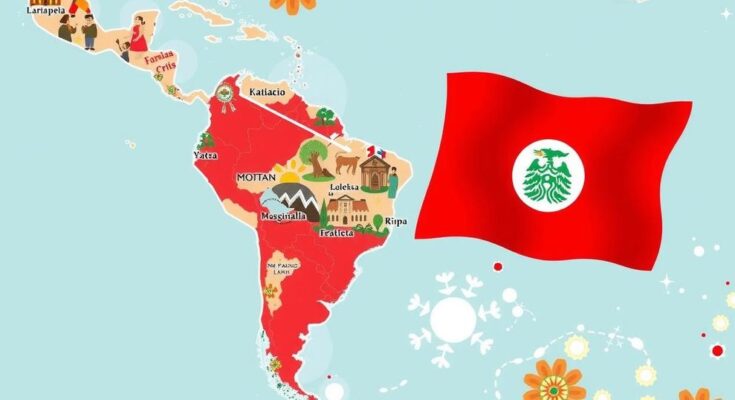In 2024, numerous Latin American countries, including Ecuador, Panama, Peru, Brazil, Paraguay, and Chile, have shifted their support towards Morocco regarding the Sahara issue. This alteration follows successful diplomatic efforts led by King Mohammed VI, resulting in the suspension of recognition for the Polisario entity by several nations and increasing advocacy for Morocco’s autonomy initiative as a feasible resolution to the conflict.
In 2024, a significant transformation occurred in the stances of various Latin American countries regarding the Moroccan Sahara conflict. Led by King Mohammed VI, Morocco’s diplomatic initiatives have successfully garnered support while diminishing separatist claims in the region. King Mohammed VI, in his statement commemorating the Green March anniversary, underscored the importance of uniting to uphold Morocco’s territorial sovereignty, prompting a wave of diplomatic actions that have swayed numerous Latin American nations towards recognizing the legitimacy of Morocco’s cause.
Countries including Ecuador, Panama, Peru, Brazil, Paraguay, and Chile have increasingly endorsed Morocco’s proposal for autonomy as a viable and enduring resolution to the long-standing Sahara dispute. Ecuador, for instance, chose to retract its recognition of the separatist entity in October, and Panama followed suit in November by severing its links with it. The growing international consensus has highlighted the recognized illegitimacy of the “Polisario” within international legal frameworks. Miguel Angel Rodriguez Mackay, the former Foreign Minister of Peru, remarked on the inevitability of withdrawing recognitions from the entity.
Furthermore, Paraguay’s parliament formally expressed support for Morocco’s territorial integrity, urging its government to align with this position. The Brazilian Senate endorsed Morocco’s autonomy initiative, with the Brazilian Foreign Minister commending Morocco’s constructive approach toward resolving the conflict during his visit to Rabat. Chile’s Foreign Minister similarly declared the nation’s support for a fair and lasting political resolution congruent with Morocco’s initiative.
In addition to diplomatic advancements, an economic forum has been established to enhance strategic cooperation between Morocco and Latin American and Caribbean nations. Such initiatives have also been met with backing from regional parliamentary organizations such as the Mercosur Parliament and the Central American Parliament. Moreover, Morocco’s efforts have progressively gained traction among public opinion in Latin America, eroding the historical support previously enjoyed by the Polisario, largely attributed to backing from Algeria. This shift signifies an evolving acknowledgment among Latin American elites of the legitimacy of the Moroccan cause and the practicality of its autonomy proposal.
Through methodical and impactful diplomacy, Morocco is achieving consistent triumphs on the international platform, leading to the potential obsolescence of separatist arguments as global perspectives continue to evolve rapidly.
The Moroccan Sahara issue has long been a contentious point in international relations, particularly between Morocco and separatist factions like the Polisario Front. The conflict was stirred by claims for self-determination by the Sahrawi people, but Morocco contends that the Sahara is an integral part of its territory. In light of changing geopolitical dynamics, Morocco has been actively pursuing diplomatic recognition and support from various nations, particularly in Latin America, to bolster its stance against separatism and promote its autonomy initiative.
In summary, the developments of 2024 mark a pivotal shift in Latin America’s diplomatic landscape concerning the Moroccan Sahara issue. With several countries retracting recognition of the Polisario entity and voicing support for Morocco’s territorial integrity and autonomy proposal, it is evident that Morocco’s strategic diplomatic efforts are bearing fruit. These shifts underscore a broader recognition of the legitimacy of Morocco’s claims and reflect a changing perspective on historical alliances in the region.
Original Source: fesnews.media




